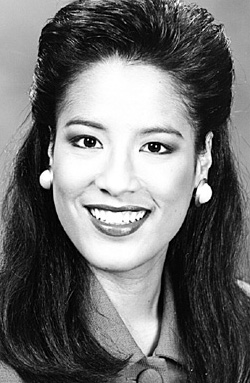GOLDSEA | ASIAMS.NET | ASIAN AMERICAN PERSONALITIES
ASIAN AMERICAN AIR FORCE
PAGE 10 OF 11
| "That for me is the most fun. You get to meet people and go places. It really gets you out and around." |
GS: What was the average number of hours a week you worked at CNN?
EY: A little under 40 because we're on the air so much, I was on from six to nine and had a meeting afterward, so my day ended up being short on the other end of the newscast.
GS: Did you look for the KRON job or did they come looking for you?
EY: My agent found it for me.
GS: Does everyone have an agent?
EY: A lot of people do, especially on-air people.
GS: How do you get an agent?
EY: They can come looking for you, or in this case, this agent was working for a colleague in Portland and she suggested I give him a call.
GS: Have you ever encountered sexual harrassment or anything unpleasant because of your race?
EY: A lot of this was in the early 80s and there was a lot of awareness of affirmative action. Whenever I was new in a newsroom some people questioned whether I got my job because of my skills or because of my ethnicity.
GS: How did that make you feel?
EY: It's an unfair conclusion for people to jump to, but given the context of what was going on it wasn't unexpected. The only thing you can do is over time prove that you're serious about your job and that you can perform.
GS: How long did you stay at CNN?
EY: 18 months.
GS: Why did you move?
EY: One, I missed reporting. The job I got at KRON was as a weekend anchor and weekday reporter. Second, the schedule was just too grueling. A lot of times our schedules would get changed and I ended up working overnights where I would go in at midnight and finish at six in the moring. I concluded that it was really best to sleep when everyone else is sleeping and be awake when anyone else is awake. The third reason was that the West Coast was closer to home and I just felt more at home here. And San Francisco is a great city.
GS: What price did you pay for making the move?
EY: It was in San Francisco that I really put in those long grueling hours. The previous jobs were anchoring. In San Francisco it was anchoring and reporting and I loved doing special reports that took more time. It was in San Francisco that I put in time on my days off or worked extra long hours.
GS: Are you working 40 hours a week?
EY: It's a pretty steady schedule. It's a day schedule because I anchor 11:30 to 12 and spend the rest of the day doing consumer reports which goes on the evening newscasts. But this past weekend I was in both days [of the weekend]. It just depends on what comes up.

MALOU NUBLA has been KRON's Traffic Watch 4 reporter for the 5:30 and 6 a.m. slots since last December. Prior to that Nubla was a sports anchor at Oakland's KTOP-TV.
GS: What's the most attractive thing about it for someone starting out?
EY: For me it's putting stories together. You go out, you find an interesting story, interview people, you bring back the material and put it togoether. That for me is the most fun. You get to meet people and go places. It really gets you out and around.
GS: Have things changed much since you began? Now there are a lot more Asian reporters on TV.
EY: Definitely. In the beginning [Asian reporters were] an anomaly. Now it's just part of the landscape.
GS: Do stations make an effort to recruit people of diverse ethnic background?
EY: I think so. Especially here in California and the Bay Area. The management feels it is important that our news reflects that diversity, not only in terms of the people on the air but in terms of the stories we cover. PAGE 11
| PAGE 1 | 2 | 3 | 4 | 5 | 6 | 7 | 8 | 9 | 10 | 11 |
CONTACT US
|
ADVERTISING INFO
© 1996-2013 Asian Media Group Inc
No part of the contents of this site may be reproduced without prior written permission.
